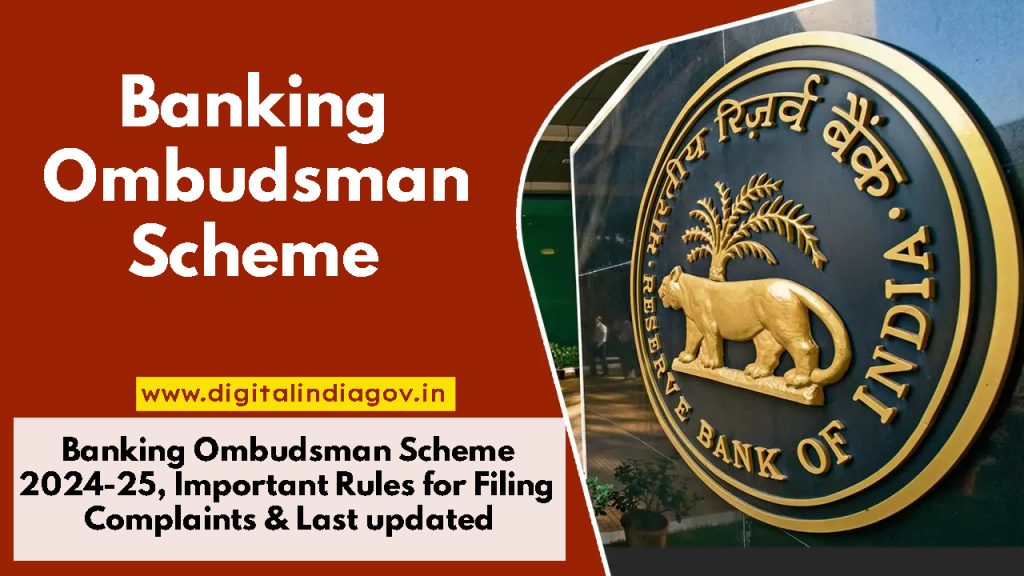Banking Ombudsman Scheme:- A quasi-judicial entity called the Banking Ombudsman was created to hear and resolve customer complaints against the bank. Section 35A of the Banking Regulation Act of 1949 governs the Banking Ombudsman Scheme. Aspirants in the finance and banking fields are expected to be knowledgeable of both the practical objectives and the Banking Ombudsman exam strategy. In 2006, the Reserve Bank of India (RBI) announced the Banking Ombudsman Scheme. In addition to scheduled commercial banks, the program also includes scheduled primary cooperative banks and regional rural banks. The RBI has extended the concept of the Banking Ombudsman to encompass non-banking financial institutions or NBFCs. About fifteen Banking Ombudsman have been appointed, most of whom have offices within the State.
Contents
Banking Ombudsman – Important Facts
- The Reserve Bank of India first proposed the idea of a Banking Ombudsman in 2006. It was later revised and altered in 2007 and 2009 to provide this office with additional ability to handle client complaints and settle disputes. It opened for business on January 1st, 2006.
- The Banking Ombudsman Scheme of 2006 covers all commercial, scheduled primary cooperative, and regional rural banks in the country.
- The appointment of a General Manager, Chief General Manager, or other appropriate authority as an executive is permissible for the position of Banking Ombudsman.
- An Ombudsman holds office for a term of three years.
- This service is provided without any costs or fees.

Also Read:- Post Office Senior Citizen Scheme, Digitize India, Digitize India Platform, Work From Home Jobs, Celebrity Phone Number, Digital India Data Entry Jobs, Mobile Number Tracker with Google Map
Powers of Banking Ombudsman Scheme
The banking ombudsman has the following authority:
- Consult with any further information that the bank that has been the subject of a complaint has supplied, as well as any potential involvement from other institutions.
- Request certified copies of all material pertinent to the complaint.
- keeping any information or documents they may acquire private
- “Summary in nature” describes the type of procedures before the Banking Ombudsman.
- The Deputy Governor, who oversees the RBI Department responsible for carrying out the Banking Ombudsman Scheme, serves as the Appellate Authority.
What are the Pre-conditions for Filing Complaints?
The requirements that bank clients must meet in order to file complaints with the Banking Ombudsman against a bank are as follows:
- The complainant should have sent a representation to the bank, but either the complaint was denied, the complainant was not happy with the response they received, or the complainant did not hear back from the bank within a month of sending their representation.
- A year cannot pass after the complainant receives the bank’s response to his complaint before he files a complaint.
- The complaint is not related to the same subject area that the suit procedures are currently handling before any court, tribunal, arbitrator, etc., or that any such authority has already issued a decree, award, or order.
- The maximum compensation amount is INR 10 Lakhs.
- The grievance ought to be sincere rather than frivolous or inappropriately motivated.
What are the Grounds of Complaints?
The following are typical reasons for inadequate banking services that fall under the purview of the Banking Ombudsman program:
- Non-payment or unreasonable delay of payment and collection of bills, cheques, etc.
- Refusal to open a deposit account or close the account or delay in terminating the accounts without a valid justification for any such delay or refusal.
- Non-acceptance of tiny denominations of notes and coins without a solid justification.
- Not abiding by the guidelines set forth by the Banking Codes & Standard Board of India (BCSBI) and engaging in unfair practices.
- failure to adhere to the serviceability hours as specified.
- Not issuing drafts, pay orders, banker’s checks, etc., or issuing them slowly.
- Anything else about noncompliance with the guidelines set by the Reserve Bank of India, the Bank, and Financial Institution Regulators, concerning banking or other services.
- failure to follow RBI regulations or delay in crediting the proceeds to the parties’ accounts.
- complaints about their deposits, and other bank-related transactions, including remittances from overseas made by Non-Resident Indians (NRIs) with accounts in India.
- The denial of the credit facility application may give rise to a complaint.

Also Read:- Agneepath Scheme Apply
How to File a Complaint?
- The complainant or an approved representative must sign and clearly specify their name and address on any written complaints.
- Included should be the entire name and address of the bank branch or office that is the subject of the complaint.
- The complainant must provide the case facts, any supporting documentation, the kind and scope of the loss, and the requested remedy in their complaint.
Other Matters Prescribed by RBI from Time-to-Time
- charging a consumer without giving them enough notice in advance
- The bank or its affiliates disregard the RBI’s guidelines for the use of credit cards, debit cards, and ATMs
- Pension payments are either nonexistent or made slowly, depending on how the complaint relates to the actions of the concerned bank rather than the employees.
- refusal to accept or postponement of taking tax payments as required by the government or RBI.
- The bank has one month to comply and notify the Ombudsman of the compliance.
- Refusal to issue, postponement of issue, non-fulfillment of obligation, postponement of redemption of public securities
- Banks should emphasize the main elements of the strategy.
Which complaints are not entertained?
The Banking Ombudsman has the authority to reject any complaint if:
- The complaint is baseless and improperly motivated.
- Clause 12(5) states that the complaint is either without adequate grounds or outside of the financial jurisdiction.
- The complainant is not making a reasonable effort to pursue the complaint.
- The banking ombudsman believes that the complaint has not suffered any loss, damage, or inconvenience.
As an Arbitrator
The banking ombudsman serves as an arbitrator in the following capacities:
- The Banking Ombudsman receives disputes for arbitration from banks and their customers, as well as from other banks.
- The Ombudsman acts as an arbitrator once the parties refer a dispute to him. He does this after obtaining the parties’ consent through a duly stamped and notarized document of understanding.
- The Ombudsman may decide not to serve as an arbitrator at any point after taking on the role if he believes he cannot carry out his assigned duties on his own.
- The Banking Ombudsman complies with the regulations set forth in the 1996 Arbitration & Conciliation Act.
Consumer Protection Act
- Act 68 of 1986 brought about the Consumer Protection Act, which went into effect on April 15, 1987.
- The Act underwent extensive amendment in 2002, and the revised version went into effect in 2003.
Objectives
- The Consumer Protection Act was passed in order to safeguard the crucial rights of consumers. Among the key goals of the Consumer Protection Act are:
- Right to protection against the advertising of goods that pose a risk to life or property
- Right to information on the normal pricing, potency, purity, and quality of goods and/or services in order to educate customers and safeguard them against unfair business practices and consumer exploitation
- The chance to be heard and the guarantee that their concerns would be taken into consideration
- Right to acceptable price and availability of goods from an authority, wherever possible.
Central Councils
- The Indian government formed the Central Consumer Protection Council (CCPC) to receive and consider consumer or complainant concerns.
- The Minister of Consumer Affairs in the Central Government is often the Chairman of the Central Council, also known as the CCPC.
- The Consumer Protection Council will safeguard consumer interests under the CPA.
- The CPCC operates even at the state level, with the state’s Minister of Consumer Affairs serving as its chairman.
Objectives of the Council
- Defend customers’ rights from being marketed products and services that endanger their life or property.
- Right to information regarding the goods and/or services’ quality, quantity, cost, etc.
- The entitlement to obtain a range of products and services at reasonable costs
- Reassure customers that the council is looking out for their interests.
- Enforcing the consumer’s right to be heard is the council’s primary goal.
- To handle and settle consumer complaints, the state or federal government may set up a number of redressal organizations.
- The following Commissions handle grievance remedies under the Consumer Protection Act:
- District Forum, also called the District Consumer Problems Redressal Forum, is where district-level problems are heard. authority to handle conflicts involving up to INR 20 lakhs.
- State Commission is another name for the State Consumer Dispute Redressal Commission. It is capable of managing claims disputes ranging from INR 20 lakh to INR 100 lakh.
- The National Commission is another name for the National Consumer Redressal Commission. Over INR 100 lakh in disputes, it can handle them.
Banking Code & Standard Board of India (BCSBI)
- Competitive forces by themselves cannot guarantee fairness, quality, reasonable rates, or client transparency in bank services.
- Under the chairmanship of S.S. Tarapore, the RBI established a committee to address these and other customer service issues. It recommended creating the BCSBI as an independent watchdog to guarantee openness and the caliber of bank services that clients were promised.
Role of BCSBI
- combining statutory regulation with self-regulation
- To provide thorough guidelines and norms for treating clients fairly
- Serve as a watchdog to make sure the banks follow the codes when providing services.
- Encourage banks to practice self-regulation.
- to adopt a cooperative strategy

Also Read:- Mahila Samman Saving Scheme
Code of Banks’ Commitment to Customers
The Code applies to the goods and services that banks provide to their individual clients. It pertains primarily to the following:
- Bank accounts
- Lockers for safe deposits
- Account settlement for departed account holders
- Services for exchanging currencies abroad
- Internal Remittances in India
- Advances, loans, and assurances
- Credit histories
- Online financial services
The banking ombudsman now has 20 regional offices throughout India. In April 2017, the newest regional office was opened in Jammu and Kashmir. The list of every regional office across the nation is as follows:
| Ahmedabad, Gujarat | Kolkata, West Bengal |
| Bengaluru, Karnataka | Mumbai, Maharashtra |
| Bhopal, Madhya Pradesh | New Delhi (i) |
| Bhubaneswar, Odisha | New Delhi (ii) |
| Chandigarh | Patna, Bihar |
| Chennai, Tamil Nadu | Thiruvananthapuram, Kerala |
| Guwahati, Assam | Dehradun, Uttarakhand |
| Hyderabad, Andhra Pradesh | Ranchi, Jharkhand |
| Jaipur, Rajasthan | Jammu, Jammu & Kashmir |
| Kanpur, Uttar Pradesh | Raipur, Chhattisgarh |
Banking Ombudsman FAQs
Q. A Banking Ombudsman: Who Is He?
Ans- A senior individual designated by the RBI to manage and address consumer complaints regarding shortcomings in specific banking products and/or services is known as a banking ombudsman.
Q. By whom is the banking ombudsman appointed?
Ans- The banking ombudsman is chosen by the RBI.
Suggested Link:- Our Jharkhand
